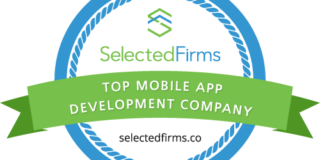When it comes to consumer behavior on social media these days, it’s no longer just about sharing photos or updates from their day. In fact, social media has become a force that can really influence sales and move the needle for a variety of businesses.
From Facebook and Instagram ads to company profiles, reviews, and more, there are a lot of ways to get your brand out there. But the key to creating a social media presence that truly makes a difference for your business? Use it as a listening tool.
That’s right—it’s easy to think of social media as a space for broadcasting only, but it’s also a valuable place to engage with your target customer.
More and more, users are expecting quick replies, customer service, and engagement with brands on social media. And the ones that follow through receive valuable customer loyalty in return.
Of course, all of that engagement is easier said than done. It’s hard enough to stay on top of your customer service requests via emails, phone calls, and messaging, without even thinking about social media. That’s where a social customer relationship management tool (social CRM) comes in.
Using the right social CRM software tracks and simplifies the process of connecting with customers on social media.
By unifying a customer profile not only with their emailing record, but also social media, a social CRM paints a fuller customer picture. Plus, it allows you to flag complaints and quickly address customer service questions. And, with shared access across departments, you can easily assign a follow-up to the right team member from sales, marketing, or support.
As a communications company that keeps teams all around the world connected to each other and customers, we know that, with any new technology investment for your business, it can be hard to know if it’s really going to make a difference for you.
That’s why today we’re diving deep into social CRMs. Here’s what we’ll cover:
How customer-obsessed is your business? Are you providing a good experience—both on social and off? Take the quiz to find out.
What is a social CRM?
We know what you’re thinking: “How does a social CRM differ from a traditional CRM?”
Well, as the name suggests, with a social CRM it’s as easy to track and respond to a customer interaction via Facebook or Twitter as it would be with phone or email inquiries using a traditional CRM.
If you’re still thinking of social media as just a marketing opportunity that’s mostly you broadcasting messages that potential customers receive, then you’re missing out.
In fact, one-sided social media is one of the biggest mistakes we see small businesses make. We know it can be time-consuming or overwhelming, but until you start seeing social media as a two-way conversation, it’s not going to work for you as efficiently as it could.
Using a social CRM, it’s easy to create and manage those conversations with your customers and prospects.
Here are just some of the key benefits of having a social CRM. It helps you:
- Provide quick, accessible customer service for easy-to-resolve issues
- Engage with customers and prospects in real time
- Create a positive brand image by helping your team flag and respond to social media complaints
- Find and celebrate your biggest fans and advocates
- Nurture better relationships with your audience
There are many benefits of a social CRM, but they boil down to one thing: creating a real connection with your customers (and potential customers). And that’s the kind of brand relationship that boosts sales and keeps customers coming back.
What to look for in a social CRM
So, having a social CRM helps you engage with your customers and leads on social media, but how exactly does it do that?
There are a couple of key things you need to look for when it comes to choosing a social CRM software.

Remember, it should do more than just keep a record of what happened. A good social CRM should make your life easier as you’re building an online community—even if you don’t have a big team or if it’s just you.
Here are the tasks your social media CRM should ideally be able to manage.
Unified social notifications
When you have customer messages and requests coming from email, phone calls, social media, chat, and more, it can understandably get hard to keep track. Factor in that social media requests can come as comments, DMs, subtweets, and more—it’s tough to manage it all.
With a social CRM, you should be able to see a stream of all your new notifications in one place, so you can read and respond immediately to exciting engagement opportunities, customer service requests, and happy customers all in one place. For example, with RingCentral Engage Digital, you can see all of a contact’s previous online—and even over-the-phone—touchpoints with you, consolidated into one profile:
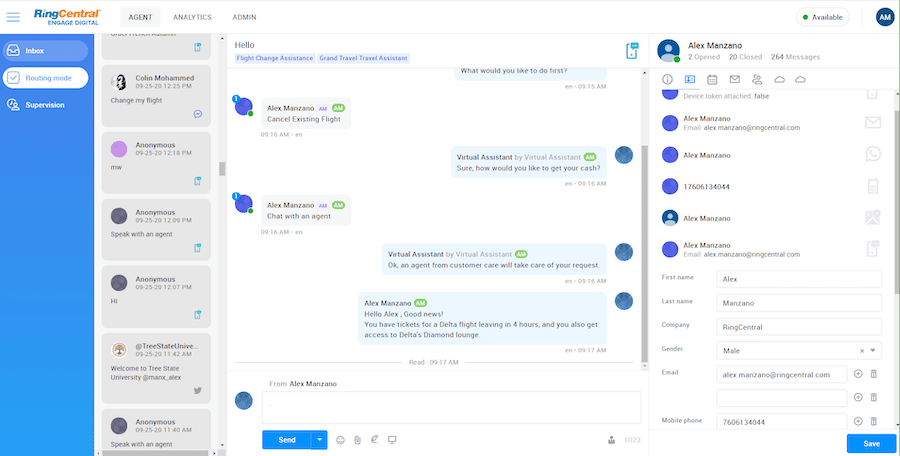
Whatever tool you choose, there should also be a way to manage, prioritize, and assign messages of all kinds so that the right team, whether it’s sales, service, or marketing, knows to get in touch.
Integrations with other communication tools
As you’re managing your social notifications, it’s not enough just to know that they came in—you also have to respond to them, of course. That’s why it’s crucial to find a social CRM software that connects with your communications tools.
With the right technology integration, you’ll not only be able to see that customer messages came in and look back through past messages but also respond seamlessly.
For instance, when you connect RingCentral to your CRM, you’re able to call customers with a single click from your CRM interface, automatically log customer communications, and seamlessly share records from your CRM with team members so everyone is on the same page. Here’s what the Salesforce integration looks like:
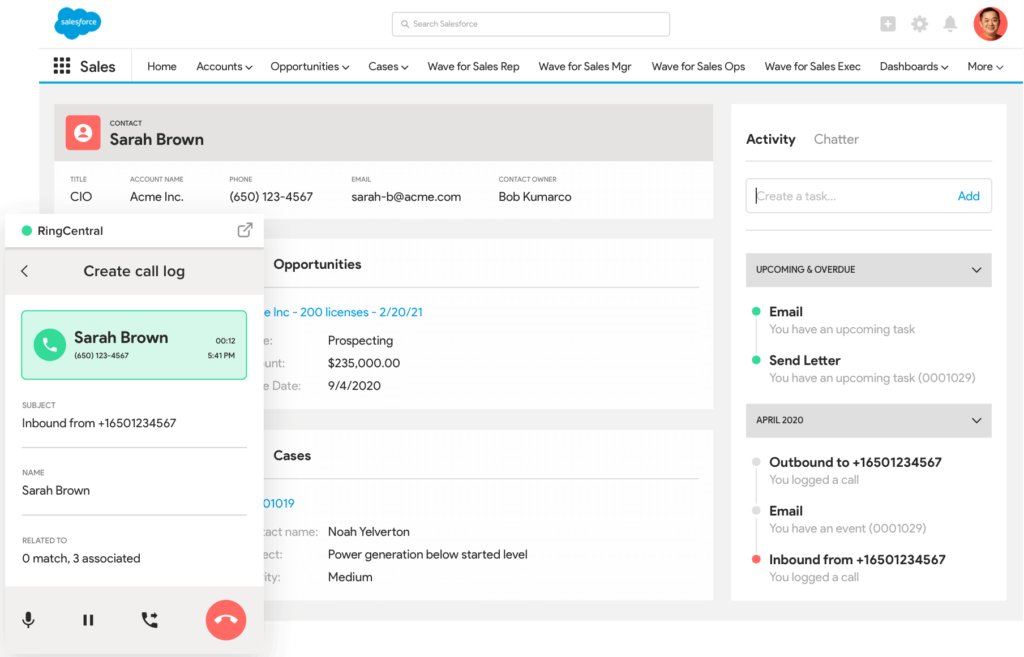
Customer contact records
Obviously, contact records are the bread and butter of what most sales teams use a CRM for, and, with a social CRM, it’s no different.
The key when you’re looking for a social CRM is to find one that can deepen your contact records by tracking a lot more than when you called or what their latest email said. By unifying contact records across social media platforms, you can save your support team from redundant work and paint a clearer customer picture for everyone.
The added context from a social CRM helps your team provide better service and create an exceptional brand experience.
Plus, a two-way sync between your social CRM and sales, marketing, and customer service software tunes you into all kinds of new customer engagement opportunities. For instance, the right social media tracking helps you discover and reward your greatest promoters.
Social listening and sentiment analysis
One feature that some social CRMs offer to help you stay on top of criticism is social listening with sentiment analysis.
Social listening allows you to monitor conversations, on your brand page or otherwise, with certain keywords (like your company’s name). This tool can be used to find new leads, study industry trends, and never miss a mention of your product.
Combined with sentiment analysis, you can get a feel not only for when people are talking about you, but how people feel.
Use these tools to keep a pulse of how your brand is being talked about on social media, keep an eye on what the competition is up to, or just be sure negative feedback receives a quick response.
5 best social CRM software tools
1. RingCentral Engage Digital™
Best for: Delivering great customer service via multiple social media channels with limited resources and time
Not sure your company really needs all the features of a social media CRM, but still want to be able to manage your social media conversations? We’ve got just the solution for you.
RingCentral Engage Digital lets you stay in control of all your social media platforms in one place.
With connections for YouTube, Instagram, Facebook Messenger, and Twitter, the platform allows you to respond to comments and messages across these platforms through a single unified dashboard. No more toggling endlessly between different tabs and windows:

By aggregating every single comment into one place, you can ensure that you’ll never miss an opportunity for engagement.
AI-enabled routing and conversation assistance routes interactions to appropriate agents across all digital channels and streamlines the process of crafting responses.
So, what’s the distinction between RingCentral and a CRM? RingCentral doesn’t quite have the same customer records system that you might be used to seeing in a CRM and doesn’t have some of the traditional CRM features you might need, like lead scoring and deal tracking.
It does, however, still consolidate social identities into a single profile, so you can see a history of interactions across channels for a given customer.
If you decide that customer records are worth the upgrade to a true CRM, RingCentral does integrate with many great options—including all the ones on this list—so you can keep your communications in one place but still have notes and customer records organized and unified.
But if you decide a true CRM is a bit more than you need, and you’d rather just add social media to your customer support communications strategy, then RingCentral is a good option.


2. Salesforce Social Studio
Best for: Companies already using Salesforce or looking to invest in a very sophisticated, full-fledged CRM platform
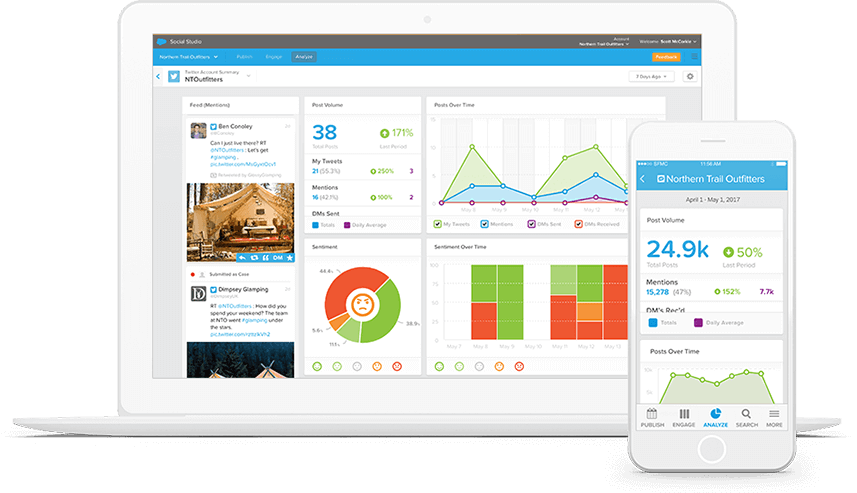
We probably don’t have to introduce you to Salesforce—they’re a giant in workplace SaaS options and offer seemingly everything a business could need, including a social CRM.
Called Social Studio, their social media CRM offers features like sentiment analysis to help you see how people are feeling, organized into a handy dashboard with statistics like number of mentions, top words used, and how many posts you’ve been publishing.
You can also get a single view of customers by routing social posts to your CRM and open service cases based on social media interactions.
You can not only reply to comments on social media, but create, collaborate on, and approve content for multiple social accounts in one place.
The drawback? With a price tag beginning at $1,000/month, Salesforce is best suited to larger organizations or those that really want to prioritize social—and pay accordingly.
3. Zoho CRM
Best for: Companies already using Zoho CRM or the Zoho suite
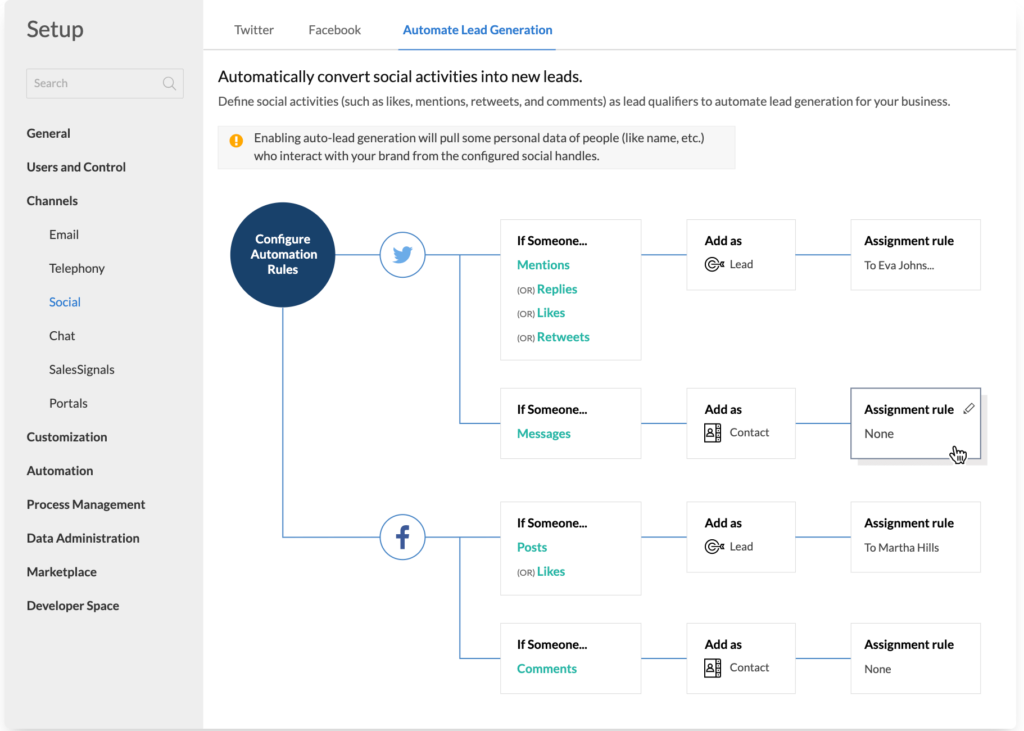
Zoho is another popular CRM that also has a social tab, which allows you to monitor the mentions, keywords, and people that matter to your business in a handy dashboard.
While this kind of social monitoring can help your team across departments, Zoho is really focused on optimizing social media for your sales team.
For example, Zoho makes it easy to add leads to your CRM based on social media conversations, either manually or automatically using automated lead generation rules.
It’s a two-way street, with automatic alerts that let you know whenever any of the leads already in your CRM are talking about you on social media—ideal for salespeople who want to optimize timing for sales calls or keep an eye on what a certain lead is thinking.
If you miss a notification, these interactions are also filed in that contact’s details, along with deal history and other important interactions. All of those details in one place add great context to sales calls and responses to posts alike.
While free accounts are available, you’ll need the paid plan to get the social CRM features, starting at $12/user/month when paid annually.
4. HubSpot
Best for: Companies looking for a broad tool that covers marketing, customer service, and sales
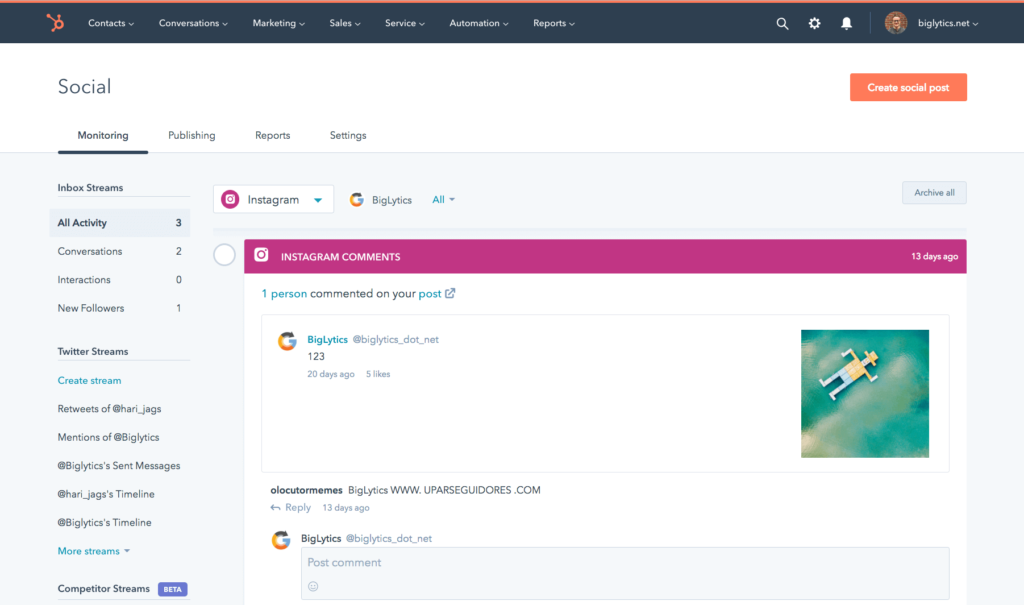
HubSpot is another giant, with software solutions that work across marketing, sales, and support departments. Their social media inbox tool is a good option for companies that want to monitor and respond to social media messages in a place where the whole team can access.
With HubSpot, you can either manually publish or schedule content across social media platforms, and then monitor responses and reply to comments right within HubSpot.
On the social dashboard, you can see every interaction, and create custom keyword monitoring through “streams” so every team member can see the interactions that are important to them.
HubSpot has a number of products, plans, and bundles to build your own suite or marketing, sales, and customer service software, with basic free tools and more advanced options starting at $45 per month.
5. HappyFox
Best for: Social media customer service on Facebook and Twitter
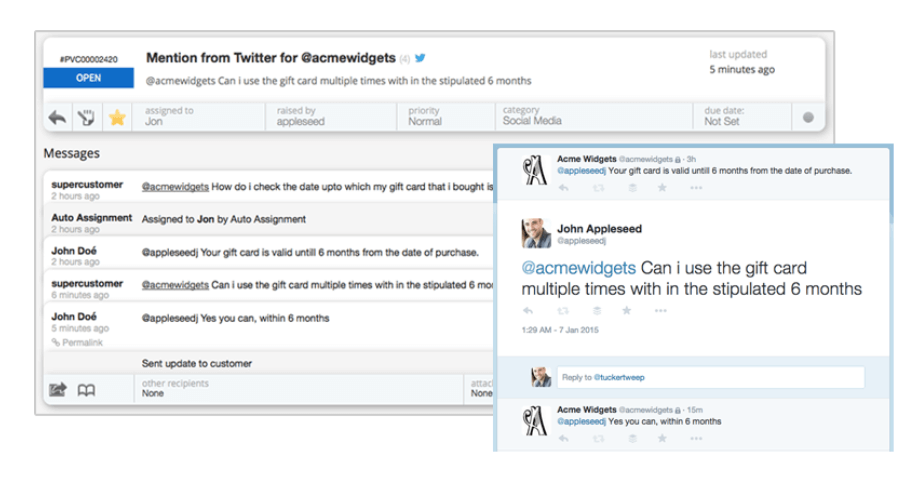
HappyFox isn’t quite a social media CRM, but we wanted to provide an option that was more focused on the customer service side of things, in case that aligns better with your social media goals. HappyFox is a social help desk software that allows you to provide incredible customer service to your customers right where they are.
Through their integration with Facebook, HappyFox converts all Facebook messages and posts on your account into support tickets, automatically converting your responses to Facebook messages when you hit send.
By integrating with Twitter, you can similarly manage Twitter requests in your help desk by converting Tweets to support tickets, as well as monitoring brand mentions.
Ultimately, this is one solution for getting all of those public requests and complaints in one place so they can be handled quickly.
But, since it only works for Facebook and Twitter, this might not be the right fit if your brand is looking to deliver customer service on Instagram or YouTube.
Does your business need a social media CRM?
Ultimately, every business is going to be different when it comes to technology needs. But if you’ve decided it’s time to turn social media into a two-way conversation, it might be time to look into getting a social CRM or a great alternative like RingCentral.
Whatever technology tool your business chooses to use, you’ll be well on your way to humanizing your brand and creating a true connection with your customers.
And that’s just good business—because when customers feel truly engaged and endeared to your brand, they’re more likely to repurchase, promote, and share your message.
Looking For Startup Consultants ?
Call Pursho @ 0731-6725516
Telegram Group One Must Follow :
For Startups: https://t.me/daily_business_reads




